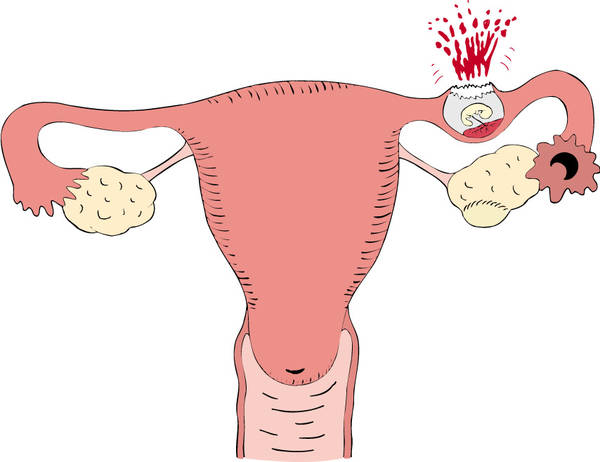What is an ectopic pregnancy?
In a normal pregnancy, a fertilized egg travels through a fallopian tube to the uterus. The egg attaches in the uterus and starts to grow. But in an ectopic pregnancy , the fertilized egg attaches (or implants) someplace other than the uterus, most often in the fallopian tube. (This is why it is sometimes called a tubal pregnancy.) In rare cases, the egg implants in an ovary, the cervix, or the belly.
There is no way to save an ectopic pregnancy. It cannot turn into a normal pregnancy. If the egg keeps growing in the fallopian tube, it can damage or burst the tube and cause heavy bleeding that could be deadly. If you have an ectopic pregnancy, you will need quick treatment to end it before it causes dangerous problems.
What causes an ectopic pregnancy?
An ectopic pregnancy is often caused by damage to the fallopian tubes. A fertilized egg may have trouble passing through a damaged tube, causing the egg to implant and grow in the tube.
Things that make you more likely to have fallopian tube damage and an ectopic pregnancy include:
- Smoking. The more you smoke, the higher your risk of an ectopic pregnancy.
- Pelvic inflammatory disease (PID). This is often the result of an infection such as chlamydia or gonorrhea.
- Endometriosis, which can cause scar tissue in or around the fallopian tubes.
- Being exposed to the chemical DES before you were born.
Some medical treatments can increase your risk of ectopic pregnancy. These include:
- Surgery on the fallopian tubes or in the pelvic area.
- Fertility treatments such as in vitro fertilization.
What are the symptoms?
In the first few weeks, an ectopic pregnancy usually causes the same symptoms as a normal pregnancy, such as a missed menstrual period, fatigue, nausea, and sore breasts.
The key signs of an ectopic pregnancy are:
- Pelvic or belly pain. It may be sharp on one side at first and then spread through your belly. It may be worse when you move or strain.
- Vaginal bleeding.
If you think you are pregnant and you have these symptoms, see your doctor right away.
How is an ectopic pregnancy diagnosed?
A urine test can show if you are pregnant. To find out if you have an ectopic pregnancy, your doctor will likely do:
- A pelvic exam to check the size of your uterus and feel for growths or tenderness in your belly.
- A blood test that checks the level of the pregnancy hormone (hCG). This test is repeated 2 days later. During early pregnancy, the level of this hormone doubles every 2 days. Low levels suggest a problem, such as ectopic pregnancy.
- An ultrasound. This test can show pictures of what is inside your belly. With ultrasound, a doctor can usually see a pregnancy in the uterus 6 weeks after your last menstrual period.
How is it treated?
The most common treatments are medicine and surgery. In most cases, a doctor will treat an ectopic pregnancy right away to prevent harm to the woman.
Medicine can be used if the pregnancy is found early, before the tube is damaged. In most cases, one or more shots of a medicine called methotrexate will end the pregnancy. Taking the shot lets you avoid surgery, but it can cause side effects. You will need to see your doctor for follow-up blood tests to make sure the shot worked.
For a pregnancy that has gone beyond the first few weeks, surgery is safer and more likely to work than medicine. If possible, the surgery will be laparoscopy (say “lap-uh-ROSS-kuh-pee”). This type of surgery is done through one or more small cuts (incisions) in your belly. If you need emergency surgery, you may have a larger incision.
What can you expect after an ectopic pregnancy?
Losing a pregnancy is always hard, no matter how early it happened. Take time to grieve your loss, and get the support you need to make it through this time.
You could be at risk for depression after an ectopic pregnancy. If you have symptoms of depression that last for more than a couple of weeks, be sure to tell your doctor so you can get the help you need.
It is common to worry about your fertility after an ectopic pregnancy. Having an ectopic pregnancy does not mean that you can’t have a normal pregnancy in the future. But it does mean that:
- You may have trouble getting pregnant.
- You are more likely to have another ectopic pregnancy.
If you get pregnant again, be sure your doctor knows that you had an ectopic pregnancy before. Regular testing in the first weeks of pregnancy can find a problem early or let you know that the pregnancy is normal.

